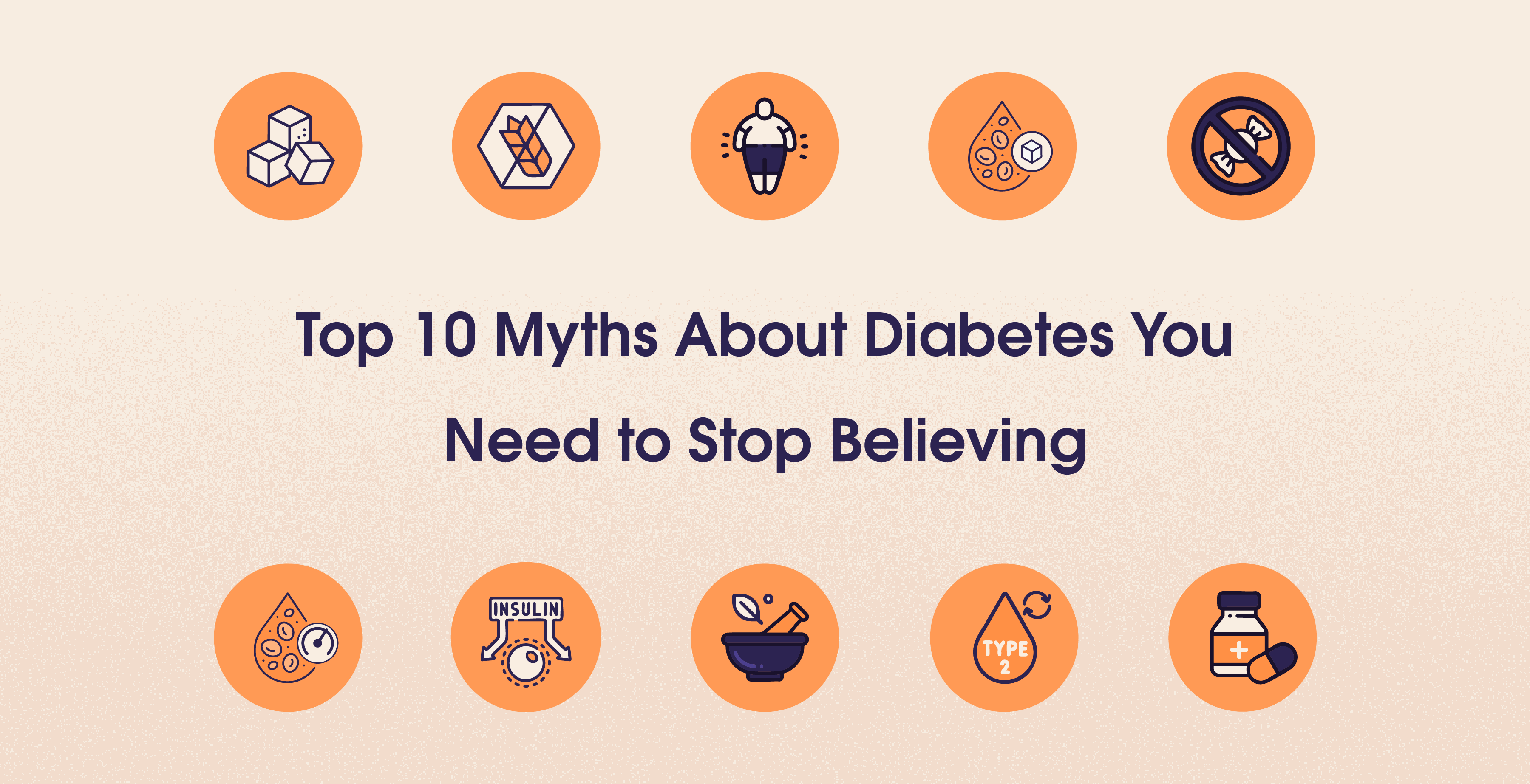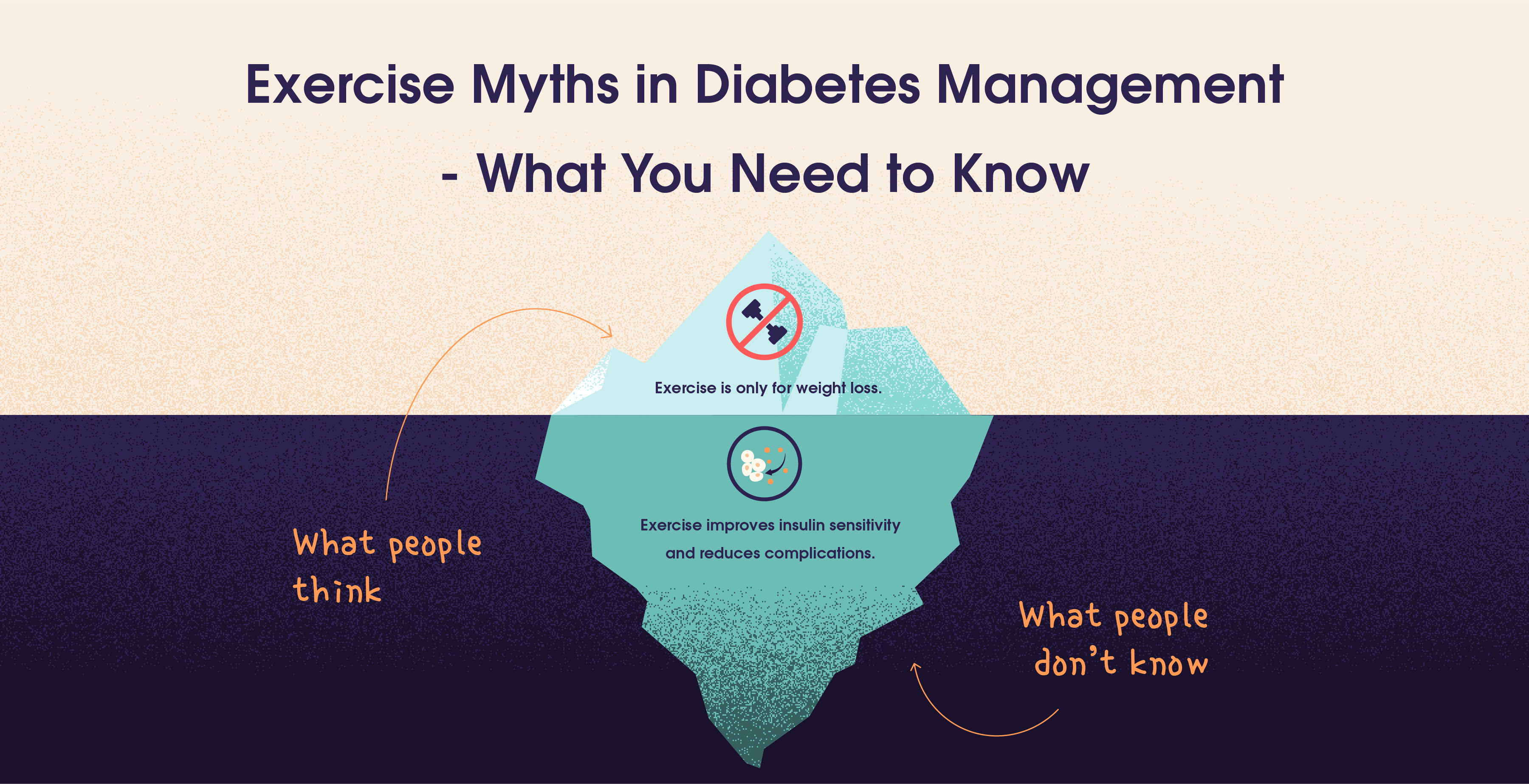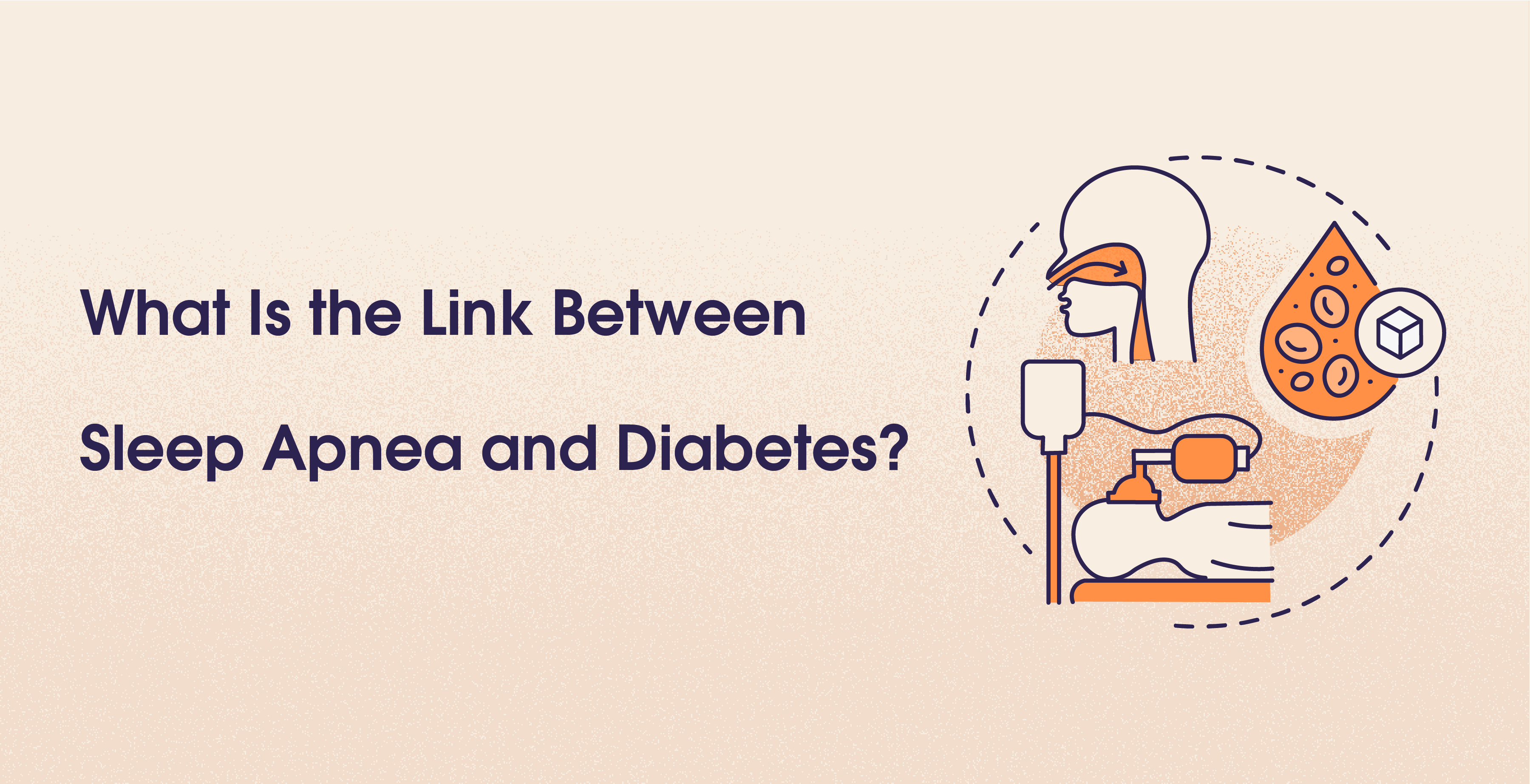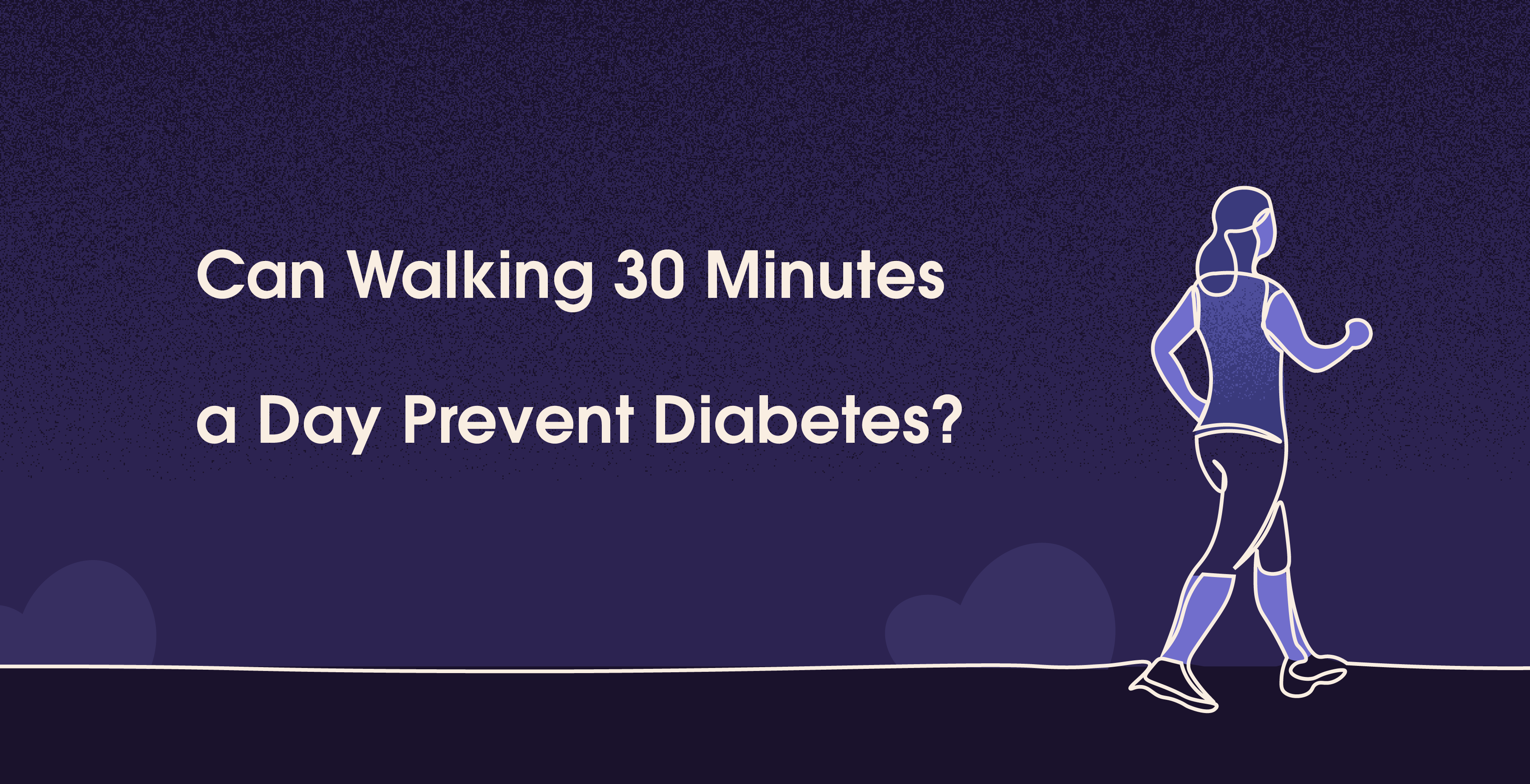Top 10 Myths About Diabetes You Need to Stop Believing
Feb 10, 2025
Aparna Hurtis



Table Of Contents
Diabetes. Just hearing the word makes some people instantly think of sugar-laden desserts and insulin injections. But for all the chatter about this condition, there’s a ton of misinformation floating around. Some myths are just annoying, while others? They can actually be dangerous. So, let’s bust through the noise and set the record straight on the top ten myths about diabetes.
Highlights
Eating too much sugar doesn’t directly cause diabetes; it’s more about genetics, lifestyle, and insulin resistance.
Carbs aren’t the enemy—choosing the right type and portion is key for blood sugar management.
Diabetes isn’t limited to overweight individuals; genetics and other factors play a role too.
It affects more than just blood sugar—heart, kidney, and nerve health are also at risk.
People with diabetes can still enjoy sweets in moderation with smart pairing and portion control.
Blood sugar fluctuations aren’t always noticeable, making regular monitoring essential.
Taking insulin isn’t a failure—it’s a necessary tool for managing diabetes effectively.
Natural remedies can help regulate blood sugar but won’t cure diabetes.
Type 2 diabetes remission is possible for some, but not everyone can reverse it completely.
Medications help but aren’t a substitute for a balanced lifestyle and long-term care.
Myths About Diabetes You Should Not Believing
Eating Too Much Sugar Causes Diabetes
The classic one. People love pointing fingers at sugar like it’s the ultimate villain. But the truth? It’s way more complicated. Type 1 diabetes is an autoimmune condition—your immune system goes rogue and attacks insulin-producing cells. Type 2, on the other hand, is more about genetics, lifestyle, and insulin resistance. Sure, excessive sugar can contribute to weight gain, which may increase the risk of Type 2 diabetes, but eating a single candy bar isn’t going to suddenly flip the switch.
If You Have Diabetes, You Can’t Eat Carbs
Hold up—since when did carbs become public enemy number one? People with diabetes don’t need to ban carbs from their lives; they just need to be mindful of the type and quantity. Whole grains, fiber-rich foods, and balanced meals keep blood sugar in check. It’s not about eliminating carbs—it’s about choosing smarter ones.
Only Overweight People Get Diabetes
Weight does play a role, but it’s not the whole picture. Plenty of people with Type 2 diabetes are within a "healthy" weight range, and on the flip side, many overweight individuals never develop it. Genetics, diet, stress, and even sleep habits influence diabetes risk. So, let’s not oversimplify things.
Diabetes Is Just About Blood Sugar
If only it were that simple. Diabetes affects your entire body—your heart, kidneys, nerves, and even your vision. Chronically high blood sugar can lead to complications like nerve damage, kidney disease, and heart issues. It’s not just about keeping sugar levels in check; it’s about overall health and balance.
People With Diabetes Can’t Eat Sweets
Let’s be real—everyone deserves a treat. People with diabetes can still enjoy their favorite desserts; they just need to be strategic. Pairing sweets with protein or healthy fats can help manage blood sugar spikes. Plus, portion control and timing make a difference. It’s about balance, not deprivation.
You’ll Always Know If Your Blood Sugar Is Too High or Too Low
Nope. Blood sugar levels can be sneaky. Some people feel nothing at all, while others might experience symptoms like dizziness, fatigue, or confusion. Relying on how you "feel" to judge blood sugar levels isn’t a foolproof strategy. That’s why monitoring is key.
Taking Insulin Means You’ve Failed
This one needs to go. Insulin isn’t a punishment—it’s a tool. For some people, lifestyle changes and oral medications work for a while, but diabetes is progressive. If your doctor prescribes insulin, it means your body needs extra help, not that you did something wrong.
Natural Remedies Can Cure Diabetes
Wouldn’t that be nice? While things like cinnamon, apple cider vinegar, and herbal supplements might help with blood sugar regulation, they’re not cures. Diabetes management requires a combination of diet, exercise, medication (when needed), and lifestyle changes. There’s no magic potion—if there were, we’d all know about it by now.
Type 2 Diabetes Is Reversible for Everyone
Yes, some people can put Type 2 diabetes into remission with major lifestyle shifts—losing weight, eating clean, staying active—but it’s not a one-size-fits-all situation. Factors like genetics and insulin resistance play a big role. Some people do everything "right" and still need medication. It’s not failure, it’s biology.
Diabetes Isn’t a Big Deal If You Take Medication
Popping a pill or taking insulin isn’t a free pass to ignore everything else. Diabetes management is about the whole picture—diet, exercise, stress management, and regular checkups. Meds help, but they’re not a substitute for taking care of yourself.
Final Thoughts
Misinformation about diabetes is everywhere, and believing these myths can do more harm than good. The reality? Diabetes is complex, and managing it isn’t about following strict, joyless rules—it’s about balance, knowledge, and finding what works for you. So next time you hear one of these myths, call it out. Because the more we talk about the truth, the better off we all are.
References
Diabetes. Just hearing the word makes some people instantly think of sugar-laden desserts and insulin injections. But for all the chatter about this condition, there’s a ton of misinformation floating around. Some myths are just annoying, while others? They can actually be dangerous. So, let’s bust through the noise and set the record straight on the top ten myths about diabetes.
Highlights
Eating too much sugar doesn’t directly cause diabetes; it’s more about genetics, lifestyle, and insulin resistance.
Carbs aren’t the enemy—choosing the right type and portion is key for blood sugar management.
Diabetes isn’t limited to overweight individuals; genetics and other factors play a role too.
It affects more than just blood sugar—heart, kidney, and nerve health are also at risk.
People with diabetes can still enjoy sweets in moderation with smart pairing and portion control.
Blood sugar fluctuations aren’t always noticeable, making regular monitoring essential.
Taking insulin isn’t a failure—it’s a necessary tool for managing diabetes effectively.
Natural remedies can help regulate blood sugar but won’t cure diabetes.
Type 2 diabetes remission is possible for some, but not everyone can reverse it completely.
Medications help but aren’t a substitute for a balanced lifestyle and long-term care.
Myths About Diabetes You Should Not Believing
Eating Too Much Sugar Causes Diabetes
The classic one. People love pointing fingers at sugar like it’s the ultimate villain. But the truth? It’s way more complicated. Type 1 diabetes is an autoimmune condition—your immune system goes rogue and attacks insulin-producing cells. Type 2, on the other hand, is more about genetics, lifestyle, and insulin resistance. Sure, excessive sugar can contribute to weight gain, which may increase the risk of Type 2 diabetes, but eating a single candy bar isn’t going to suddenly flip the switch.
If You Have Diabetes, You Can’t Eat Carbs
Hold up—since when did carbs become public enemy number one? People with diabetes don’t need to ban carbs from their lives; they just need to be mindful of the type and quantity. Whole grains, fiber-rich foods, and balanced meals keep blood sugar in check. It’s not about eliminating carbs—it’s about choosing smarter ones.
Only Overweight People Get Diabetes
Weight does play a role, but it’s not the whole picture. Plenty of people with Type 2 diabetes are within a "healthy" weight range, and on the flip side, many overweight individuals never develop it. Genetics, diet, stress, and even sleep habits influence diabetes risk. So, let’s not oversimplify things.
Diabetes Is Just About Blood Sugar
If only it were that simple. Diabetes affects your entire body—your heart, kidneys, nerves, and even your vision. Chronically high blood sugar can lead to complications like nerve damage, kidney disease, and heart issues. It’s not just about keeping sugar levels in check; it’s about overall health and balance.
People With Diabetes Can’t Eat Sweets
Let’s be real—everyone deserves a treat. People with diabetes can still enjoy their favorite desserts; they just need to be strategic. Pairing sweets with protein or healthy fats can help manage blood sugar spikes. Plus, portion control and timing make a difference. It’s about balance, not deprivation.
You’ll Always Know If Your Blood Sugar Is Too High or Too Low
Nope. Blood sugar levels can be sneaky. Some people feel nothing at all, while others might experience symptoms like dizziness, fatigue, or confusion. Relying on how you "feel" to judge blood sugar levels isn’t a foolproof strategy. That’s why monitoring is key.
Taking Insulin Means You’ve Failed
This one needs to go. Insulin isn’t a punishment—it’s a tool. For some people, lifestyle changes and oral medications work for a while, but diabetes is progressive. If your doctor prescribes insulin, it means your body needs extra help, not that you did something wrong.
Natural Remedies Can Cure Diabetes
Wouldn’t that be nice? While things like cinnamon, apple cider vinegar, and herbal supplements might help with blood sugar regulation, they’re not cures. Diabetes management requires a combination of diet, exercise, medication (when needed), and lifestyle changes. There’s no magic potion—if there were, we’d all know about it by now.
Type 2 Diabetes Is Reversible for Everyone
Yes, some people can put Type 2 diabetes into remission with major lifestyle shifts—losing weight, eating clean, staying active—but it’s not a one-size-fits-all situation. Factors like genetics and insulin resistance play a big role. Some people do everything "right" and still need medication. It’s not failure, it’s biology.
Diabetes Isn’t a Big Deal If You Take Medication
Popping a pill or taking insulin isn’t a free pass to ignore everything else. Diabetes management is about the whole picture—diet, exercise, stress management, and regular checkups. Meds help, but they’re not a substitute for taking care of yourself.
Final Thoughts
Misinformation about diabetes is everywhere, and believing these myths can do more harm than good. The reality? Diabetes is complex, and managing it isn’t about following strict, joyless rules—it’s about balance, knowledge, and finding what works for you. So next time you hear one of these myths, call it out. Because the more we talk about the truth, the better off we all are.
References
Table Of Contents
Table Of Contents
Table Of Contents
Read More


Apr 2, 2025
Sayfali Rawlani


Feb 17, 2025
Aparna Hurtis


Feb 4, 2025
Sayfali Rawlani



Company
Copyright © 2025 trst health. All right reserved.

